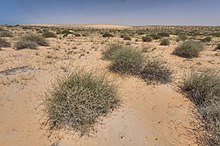
The flora of Qatar includes more than 300 species of wild plants.[1] Qatar occupies a small desert peninsula that is around 80 km (50 miles) from east to west and 160 km (100 miles) from north to south.[2] The climate is hot and humid with sporadic rain. Majority of the country is flat with an annual rainfall average of less than 3 inches.[3] Arnebia hispidissim blooms yellow flowers annually in sandy soil.[4] Glossonema edule has edible fruits with brownish-yellow flowers.[5]
Vegetation is extremely sparse in the hamada landscape due to the heavily weathered soil. A native species of tree, Vachellia tortilis (known locally as samr)[6] is well adapted to the desert environment and one of the most common forms of vegetation in the country.[7] Tetraena qatarensis and Lycium shawii also grow in this landscape.[7]
Shallow depressions referred to as rawdat constitute a more varied selection of plants since rainwater run-off is more likely to accumulate. Ziziphus nummularia favors deeper soil in this type of habitat, whereas the grass Cymbopogon parkeri is found in shallower soils. In the south of the peninsula, where groundwater is scarce, Panicum turgidum and V. tortilis grow in the wind-blown soils.[7] Vegetative distribution in the south is mostly concentrated in rawdas and in wadis fed by run-off from nearby hills. There are many other flowers species available now in Qatar for consumer purpose.[8]
Natural areas[edit]




Natural areas in Qatar include:
- Al Shahaniyah Park in Al-Shahaniya
- Al Wabra Wildlife Preservation
- Khor Al Udeid Fish Sanctuary
- Al Reem Biosphere Preserve (designated in 2007) is part of the World Network of Biosphere Reserves in the Arab States
- Ras Ushairij Gazelle Conservation Park
- Al Thakira Nature Reserve in Al Thakhira[9]
- Khor Al Adaid in Khor Al Adaid[9]
- Ras Abrouq Nature Reserve (also known as Bir Zekreet (Zekreet Beach) in Ras Abrouq[9]
- Umm Tais National Park[9]
Taxonomy[edit]
Class: Psilotopsida[edit]
Order: Ophioglossales[edit]
- Family: Ophioglossaceae
- Genus: Ophioglossum
- Ophioglossum polyphyllum (native)
- Genus: Ophioglossum
Class: Magnoliopsida[edit]
Order: Asterales[edit]
- Family: Asteraceae
- Genus: Reichardia
- Reichardia tingitana (native) (common names: huzan, mureer, and murar)[10]
- Genus: Reichardia
Order: Caryophyllales[edit]
- Family: Amaranthaceae
- Family: Caryophyllaceae
- Genus: Silene
- Silene Arabica (native)
- Genus: Silene
- Family: Polygonaceae
- Genus: Calligonum
- Calligonum comosum (native)
- Genus: Calligonum
Order: Malpighiales[edit]

- Family: Euphorbiaceae
- Genus: Mercurialis
- Mercurialis annua (introduced)
- Genus: Mercurialis
Order: Fabales[edit]
- Family: Fabaceae
- Genus: Taverniera
- Taverniera spartea (native)
- Genus: Senna
- Senna occidentalis (introduced)
- Genus: Taverniera
Order: Zygophyllales[edit]
- Family: Zygophyllaceae
- Genus: Tetraena
- Tetraena qatarensis (native)
- Genus: Tetraena
See also[edit]
References[edit]
- ^ Casey, Paula; Vine, Peter (1992). The heritage of Qatar. Immel Publishing. pp. 77.
- ^ Anthony, J. D., & Crystal, J. A. (2019, March 30). Qatar. Retrieved from https://www.britannica.com/place/Qatar
- ^ Anthony, J. D., & Crystal, J. A. (2019, March 30). Qatar. Retrieved from https://www.britannica.com/place/Qatar
- ^ Boulos, Loutfy. "Materials for a Flora of Qatar." Webbia 32.2 (1978): 369-96. Web.
- ^ Boulos, Loutfy. "Materials for a Flora of Qatar." Webbia 32.2 (1978): 369-96. Web.
- ^ "Samr". Qatar e-Nature. Retrieved 10 August 2019.
- ^ a b c Casey & Vine (1992), p. 78
- ^ Macumber, Phillip G. (2015). "Water Heritage in Qatar". Cultural Heritages of Water: Thematic Study on The Cultural Heritages of Water in the Middle East and Maghreb. UNESCO World Heritage Convention. academia.edu. UNESCO. p. 226. Retrieved 21 February 2019.
- ^ a b c d Natural Landmarks Archived 2015-07-03 at the Wayback Machine Qatar Tourism Authority
- ^ "Reichardia tingitana (L.) Roth". Flora of Qatar. Retrieved 21 February 2019.